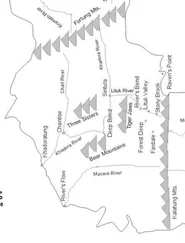You like them, these violence-inured twenty-year-olds raised along the Green Line's furrow. They possess an intensity you've never seen in any classroom. Pitching one's tent under the mortar's arc does wonders for a student's motivation.
"Why do you want to improve your English?" you ask them, on the first day of your new tenure. The diagnostic icebreaker, cheap but to
the point.
It helps with trade, Phoenicia's descendants inform you. It's the world's second tongue, say the refugees of Sidon and Tyre.
A smiling, bearded Nawaf in the front of the room summarizes. "America bosses the world around in English. We need English, just to tell America to go to hell."
The whole class laughs. When learning another language, comprehension always outstrips production. It's true, the class agrees. Americans speak nothing and own everything. The world needs to learn English, just to talk back to its owner.
Your very existence astonishes them. "How can an American have your first name?"
"How can you let yourself be coming from such a place?"
The ones you like best explain the delusions you've been living under. "Black people in your country are killed like sheep here for the end of Ramadan."
"Americans pay forty million dollars to one man for putting a ball in a ring. Instead they could buy hamburgers for forty million starving people."
They offer these earnest indictments of Sodom for your own good. But greater forces attract them to this evil. Their interest reveals itself in dribs and drabs over your first two weeks. "This Rocky, sir? You think he fights so good? He doesn't last five minutes against my cousin with mujahideen."
"This Terminator? He's not so great. Take away the big gun…"
"The Terminator is Austrian," you tell them. "He's not our fault."
"Mr. Martin? What means this? 'I am leaving the material world, and I am immaterial girl'?"
"We'll work on that one next term," you promise.
Ardent children of civil war still bathed in first innocence, they seem strangely unhardened, even by the odds against survival. They might sit basking in the afternoon, out by the marina under the St. George, if that neighborhood still existed. But they stay on, by choice or compulsion, after a million of their countrymen have thought better and bailed. Each of them is too long trained by collapse to continue hoping, yet too angry to give it up. All of them are hungry to learn the true size of the world beyond this city: a world of glossy fictions, stable, rich, progressing, theirs to glimpse only through the shadow boxes of bootlegged videotape.
You are their model, their messenger from the outside world. Your job: to chat them up for hours at a shot, training them to survive the force of their imaginations. You work to hold them to the rules of polite conversation, in a city trying to believe again in the existence of rules. It is, by any measure, the perfect job description — the ticket you've been trying to write yourself for years. A golden existence. All that's missing is someone a little brave, someone just a little kind to share it with.
"Tell me how you got here," you assign them, early on. The topic provides a high personal interest. Good practice with the tricky past tense. And it's easy to answer without straying too far outside core vocabulary.
"How did you got here, Mr. Martin?" Nawaf baits you.
The whole class becomes a sea of colluding head bobs. "Yes. Yes. We all want to know."
"Nothing to tell," you tell them. "I came here to make sure that your subjects and verbs all agree with each other."
"What job have you done before being our teacher?" Nawaf asks.
"What did I do before coming here to teach?"
"Yeah. You said it."
"A lot of things. Most recently, I trained Asian businessmen to survive Chicago."
The sly bastard persists. "Why did you change your jobs?"
"Now why in the world would that interest you?"
"It's very interesting, Mr. Martin," the very interesting Zarai chips in.
"Well, for a lot of reasons. But we're not going to get into that."
"It's a secret?" Nawaf taunts.
"That's right. Yes. It's a secret."
"Top secret?" Zarai smiles at you from beneath her head wrapping.
You smile back at her. "Tip-top secret."
They say that you know more about this place on the day you first touch your foot to it than you will ever know about it again. And they're right. Each day that passes leaves you more confused about this stew, let alone the recipe that produced it. You understand Shiite versus Sunni, Maronite versus Orthodox, Druze, Palestinian, Phalangist, AMAL, the radical Party of God and their fanatical cell the Holy Warriors. But the fourteen other religions and splinter factions plunge you into the same despair that your students feel when confronting irregular English verbs.
This al-Jumhuriyah al-Lubnaniyah: even the name is a maze. The country's politics, like some unmappable Grand Bazaar out of Ali Baba, cannot be survived except by chance. Here civilization's ground rules disperse into the mists of fantasy. Standing agreements, tenuous at best, collapse back into the law of armed camps, each local militia staking out a few shelled blocks. No one is allowed to cross from zone to zone, not even the Red Crescent. Your students scrape by in a decaying landscape, one of those postapocalypse teen movies that so intrigue them.
But for all that, the streets still seem safer than Chicago's. Tomorrow feels more affirmed here, this city's pulse more surrendered to hope and devotion.
You learn a few words: Na'am, shukran, merhadh, khubuz. Yes, no, thank you, bathroom, bread. You begin to fantasize about meeting a woman, perhaps even a woman in head covering. About taking a crash course in the rules of her grammar.
Then the real woman calls you. Dead on schedule. Just as one of you recovers some semblance of health, some solidifying core of self-esteem, the other one calls to crash it. At least now, the two-dollar-a-minute taxi meter and the audible satellite lag protect you from extended conversation.
Or they would, if she weren't wild. Cost means nothing to her. Her words come through the phone like a violent cough. "Taimur. Tai. Thank God you're alive. You have to come back. Tonight. Now."
Too pathetic, even for retaliation. You can't even rouse yourself to decent brutality.
"I don't think so," you singsong into the receiver.
"I skipped my period."
You recover before the satellite link can click. "You skip every other month, Gwen. You're a high-strung, finger-pointing, street-brawling drama queen who never menstruates in the middle of a fight. Which is pretty much all the time."
Too many adjectives, and you've lost another round. Lost her. Lost yourself. Lost the person you were trying to become by coming here, one who refuses to return knee-jerk hurt for hurt.
She starts to sob, but softly, horribly. You hear her give up on the hope of consolation. And that, where nothing else could, makes you want to console her. Succor, once more, becomes your secret sickness. Your awful, tip-top secret.
"Gwen. Don't start. We can't do this again. We both promised." "I need you, Tai. I can't do this by myself."
"Cut the theater, Gwen. You're fine. Give it another couple of weeks." "I've given it eight!'
It blossoms in you again, in the space of a second. Full-blown, the old, loving parasite you carry around inside, awaiting its chance to graze. A pillar of purity rises in your chest, so righteous it can't even be called anger. "Don't you think you ought to call the father, then?"
"You, Taimur. You. Don't you remember? Our long goodbye?" The weekend window when she seemed almost happy, knowing you were already gone. "Nobody before. Nobody since…"
The words are whiplash. And yet: they must be bluff. Florid, desperate, sadistic, even by the standards that the two of you have perfected.
Читать дальше












